Well how about that for fun? The Champions League quarterfinal, first legs, produced a ton of excitement and drama. Some big results, too: Real Madrid shrugged off key defensive absences (Sergio Ramos, Raphael Varane) to thump Jurgen Klopp and Liverpool, while Paris Saint-Germain enjoyed a bit of revenge against Bayern Munich, following last season’s 1-0 defeat for Neymar & Co. in the final to the Bavarian giants. There was also a nervy win for Manchester City against Erling Haaland and Borussia Dortmund, while Chelsea cruised to a comfortable (kinda) win over FC Porto.
– Stream ESPN FC Daily on ESPN+ (U.S. only)
– Don’t have ESPN? Get instant access
– Champions League best bets (U.S.)
With the first legs of all four Champions League quarterfinals in the books, let’s take a look at the stats that mattered most from each match and what matters the most heading into next week’s second legs.
Jump to: Real Madrid vs. Liverpool | Man City vs. Dortmund | Bayern vs. PSG | FC Porto vs. Chelsea


Real Madrid 3-1 Liverpool
Return leg: Weds. April 14, 3 p.m. ET
Wanted: Aggression
Real Madrid are third in La Liga and had to labor heavily to advance to the Champions League knockout rounds. Though they’ve flashed glimpses of all the obvious, expensive talent we’ve come to expect, this isn’t the most intimidating squad they’ve ever fielded. Heading into the quarterfinals, FiveThirtyEight gave Liverpool a 53% chance of advancing despite the Reds’ own laundry list of issues.
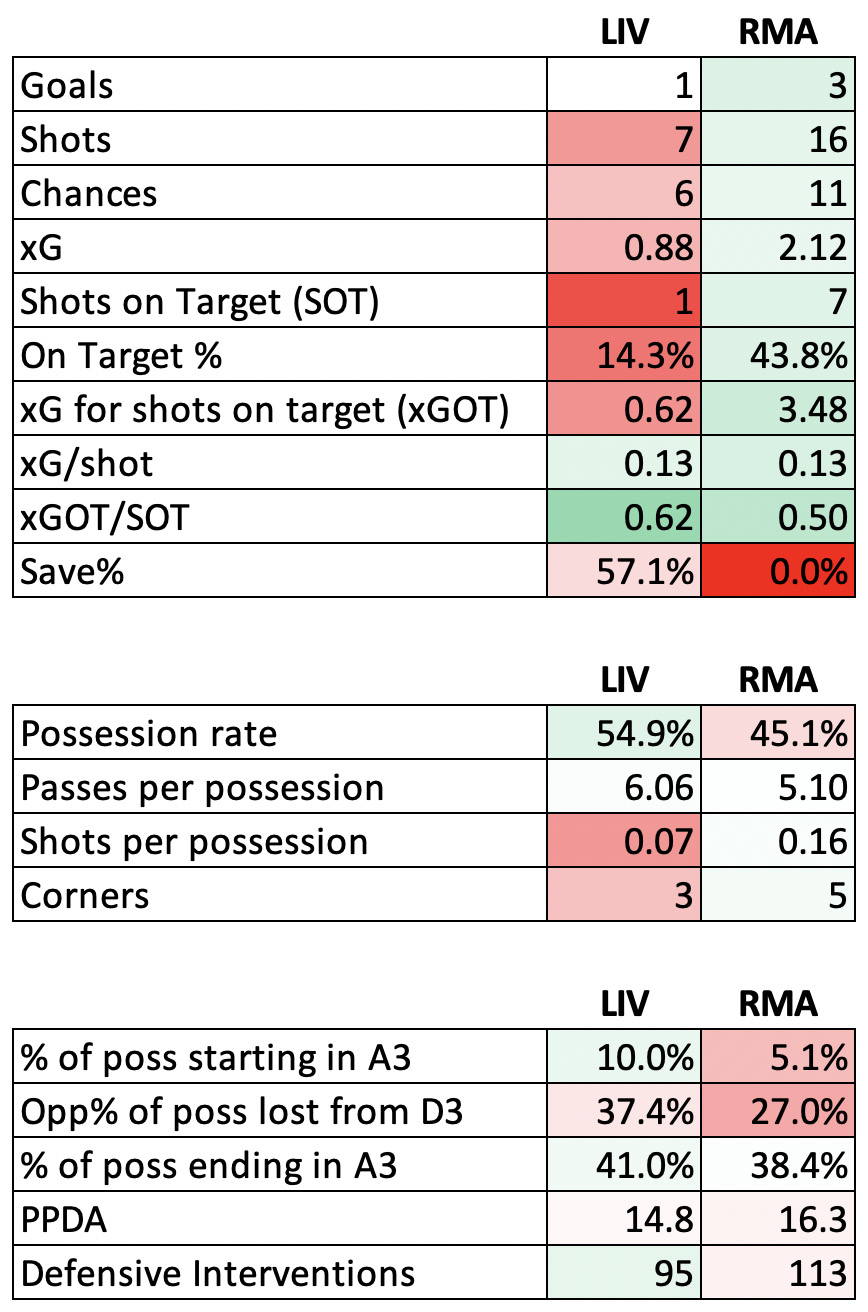
Liverpool played the first leg, however, like a massive underdog, even more than Borussia Dortmund, an actual massive underdog (18% chance of advancing), did. Everything about their approach screamed “let’s just get to the second leg down one goal.” Jurgen Klopp started neither his most press-friendly forward (Roberto Firmino), nor his most attack-minded passing midfielder (Thiago), opting for Diogo Jota and Naby Keita instead.
– Hunter: Kroos the master as Real Madrid thump Liverpool
Klopp’s system is based on a combination of possession principles and pure defensive intensity, but in Madrid, the Reds allowed 14.8 passes per defensive action, their third-highest average of the season. (The only times they were higher: against Manchester City in November, and against an equally passive Wolves in December.) They attempted zero first-half shots and logged just two touches in the penalty area.
The good news, if you can call it that: things got better. In the second half (with Thiago subbed into the lineup), they allowed 11.6 PPDA and finished 32 possessions in the attacking third to Real Madrid’s 14. They still put only one shot on goal, and while that shot went in the net, so did a 65th-minute response from Vinicius Junior off of a throw-in. Liverpool might have been the better team, but they didn’t end up cutting their two-goal deficit.
Still, the field tilted in their direction. That, combined with the road goal they managed to score, gave them a lifeline. A 2-0 win in Liverpool would put them through, and FiveThirtyEight’s projections still give them a 20% chance of advancing.
A 2-0 win requires you to keep Vini Jr. off the board, though
Two things stood out from Real Madrid’s performance: (1) they did a fantastic job of stretching Liverpool with long, accurate passes, and (2) Vinicius Jr. was maybe their best player for the second straight Champions League match.
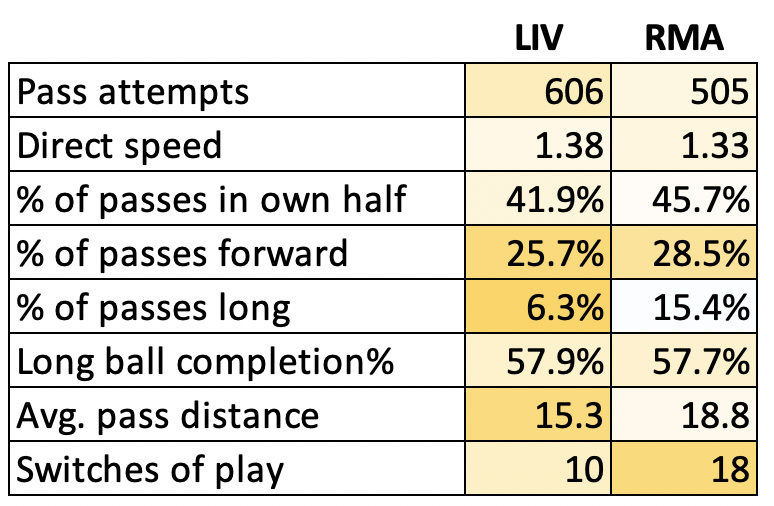
The average match features about four to five switches of play (long, mostly horizontal passes that flip the ball from one side of the field to the other) per match. Real Madrid attempted 18, including four from Toni Kroos and three each from Lucas Vazquez, Luka Modric and Eder Militao. This horizontal action stretched Liverpool’s defense and opened up vertical passing lanes; Kroos, Modric and Casemiro, Real Madrid’s aging but still technically gifted midfield, also went 19-for-25 on long balls (forward passes at least 35 yards downfield). Kroos was 9-for-9, and a long ball set up the first of two Vinicius Junior goals.
If Kroos wasn’t their best player, Vini Jr. was. He’s becoming an extremely Real Madrid player: fine in La Liga, great in the Champions League. He’s averaged 0.38 goals and assists per 90 in league play, but he’s up to 0.83 in the UCL. For the second straight knockout match (following their 3-1 win over Atalanta on March 16), he was utterly brilliant. He put two of his four shots in the net and completed 14 passes in the attacking third.
If this version of the precocious 20-year old continues to show up, Real Madrid could win the whole damn tournament.


Man City 2-1 Borussia Dortmund
Return leg: Wednesday, April 14, 3 p.m. ET
Biggest red flag for City: high-quality chances
In one sense, it’s pretty simple to prepare for Pep Guardiola’s Manchester City, as you don’t have tons of options.
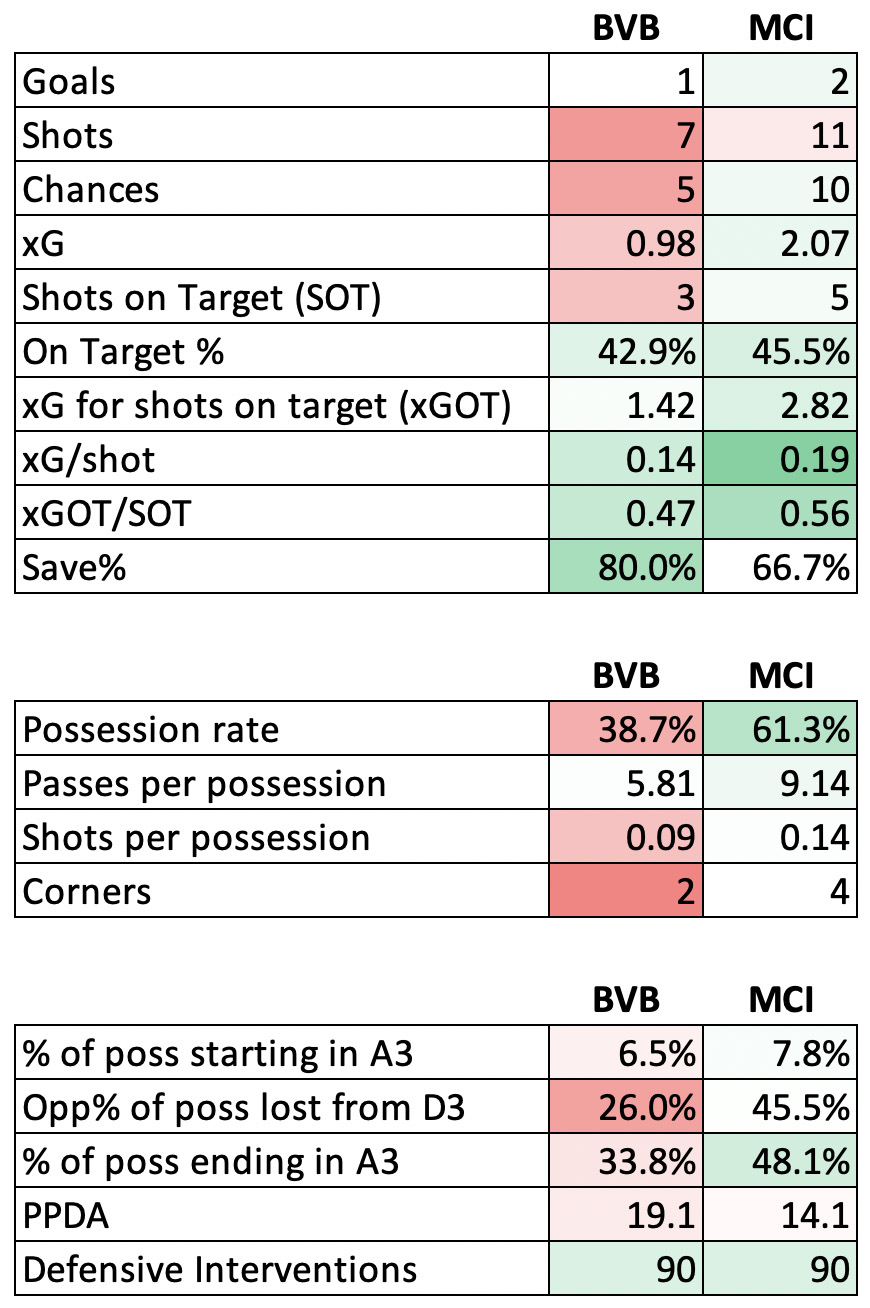
They’re much better at swallowing up counters before they begin than they were a season ago; it’s why they’re the No. 1 team in Europe right now, per FiveThirtyEight. But in each of their only two losses in the past six months (2-0 to Tottenham Hotspur and 2-0 to Manchester United), and in all four of their losses in the past eight months (including 5-2 to Leicester City and 3-1 to Lyon, the formula’s been the same:
– None of these four teams had greater than 34% possession
– None averaged more than 0.09 shots per possession
– None allowed fewer than 17 passes per defensive action (PPDA)
– None finished more than 24% of their possessions in the attacking third
– None began more than five possessions in the attacking third (only Manchester United began more than two)
– All of them averaged at least 0.13 xG per shot (only Lyon was under 0.20)
– All of them put at least 50% of their shots on target (only Spurs were under 75%)
1:14
The FC guys react to the assistant ref asking for Erling Haaland’s autograph after Dortmund’s loss to Man City.
“Create great chances and strike them well” isn’t exactly the easiest advice in the world to follow, especially against the most expensive side in the world. But BVB have to be encouraged by the fact that of the seven shots in this match that generated at least 0.1 xG, they had three of them. And that total doesn’t include the disallowed tap-in BVB’s Jude Bellingham created for himself in the 31st minute, tipping the ball away from City’s Ederson before getting called for a controversial foul.
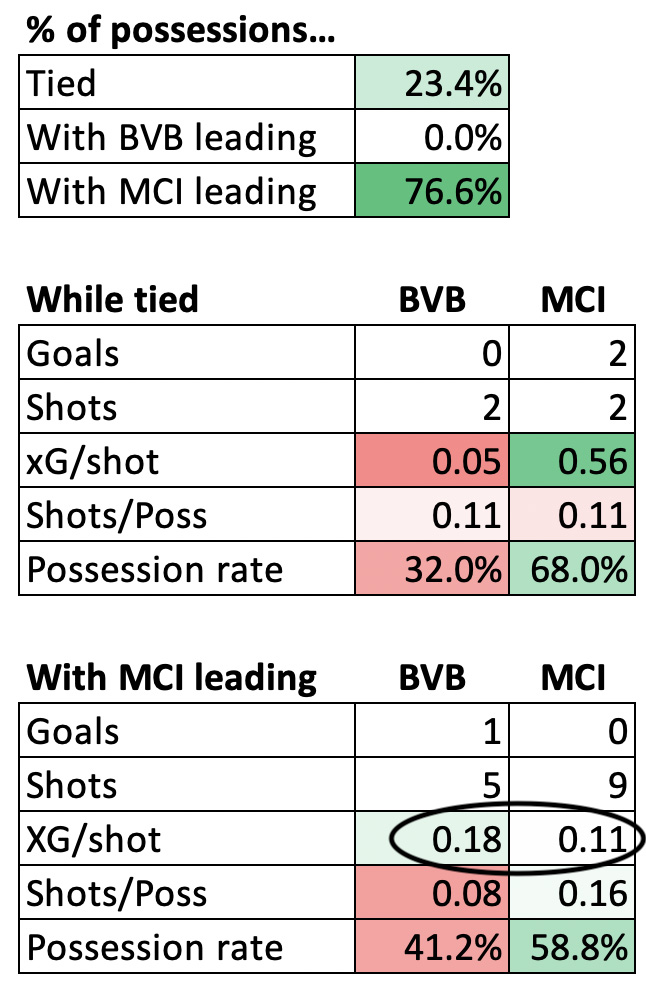
City will again control the ball in the second leg because it’s what City does. But if BVB can create four or five really good chances for itself and put two or three of them into the net — something a squad with Erling Haaland, Marco Reus and company certainly have the skill to do on a really good day, though it would be great to get Jadon Sancho back from injury — then an upset and a spot in the semifinals is still possible.
When no one’s a forward, everyone’s a forward
Borussia Dortmund’s rigid defensive structure prevented City from creating quite as many chances as they’re used to, but like termites, City finds a way through a defense eventually. And while Ilkay Gundogan has benefited the most this season from Pep Guardiola’s occasionally striker-less attack, it was Phil Foden‘s turn on Tuesday.
– Ogden: Man City win, but UCL dream looks wobbly
– Marcotti: Unpacking the Erling Haaland transfer roadshow
Though ostensibly a left winger, Foden had nine of City’s 21 touches in Dortmund’s penalty area and produced four shots, including by far their two best scoring chances of the second half. He nearly put City up 2-0 in the 65th minute and then, making an identical run with Gundogan in the 90th minute (they did that a couple of times late in the match), he pulled back, received a pass from Gundogan and put home the game-winner.
Wherever your defense lacks structural integrity, a City player will be there to exploit it. You just might know who it’s going to be ahead of time. Hmm. Maybe they aren’t simple to prepare for after all.
1:11
ESPN FC’s Craig Burley recaps the entertaining first leg between Bayern Munich and PSG.

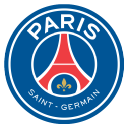
Return leg: Tuesday, April 13, 3 p.m. ET
Bayern at its most relentless (and glitchy)
In all of the leagues for which Stats Perform logs matches and sends our way, here’s a complete list of matches since August 1 in which a team (a) generated at least 2.5 more expected goals (xG) than its opponent and (b) lost. Matches in bold also featured a shots advantage of at least +25 for the losing team.
– English Championship: Bristol City 3, Swansea City 1 (Swansea’s xG advantage: +3.1)
– Ligue 1: Nice 2, Lens 1 (+2.9)
– Premier League: Crystal Palace 2, Brighton 1 (+2.6)
– Eerste Divisie: NEC 3, Vollendam 1 (+2.6)
– Chilean Primera Division: Audax Italiano 2, Cobresal 1 (+2.6)
– Japanese J1 League: Vegalta Sendai 2, Vissel Kobe 1 (+2.6)
– UEFA Champions League: PSG 3, Bayern Munich 2 (+2.5)
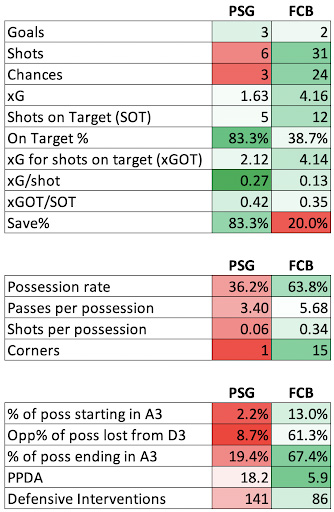
At the moment there are 15,262 matches since August 1 in our data tool. Bayern and Vissel Kobe are the only teams to pull off a loss with a +2.5 xG advantage and +25 shots margin.
A makeshift formula I created last week named Bayern as the most watchable team in Europe’s “Big Five” leagues, and Wednesday showed us why.
On the rare occasions that they’re losing, they push forward with a relentlessness we rarely see. Their possession principles are strong, they circulate the ball from side to side, they surround the defensive box with what seems like 18 players, and they start shooting, and shooting and shooting.
Eric Choupo-Moting, Thomas Muller and defender (!) David Alaba had five shots each. Kingsley Coman, whose goal beat PSG in last year’s Champions League final, had four. Benjamin Pavard had three, as did Leon Goretzka in just 33 minutes. Midfielder Joshua Kimmich created 10 chances for his teammates.
PSG’s Kylian Mbappe, meanwhile, had two shots. In the third minute, with the score tied at 0-0, his first shot put Les Parisiens ahead with his first. In the 68th, with the score tied at 2-2 and PSG having just blown a lead it spent nearly an hour protecting, his second shot provided the game winner. Neymar assisted both. The duo that was rendered scoreless by Bayern last August was cold-blooded and perfect in the two moments it needed to be so.
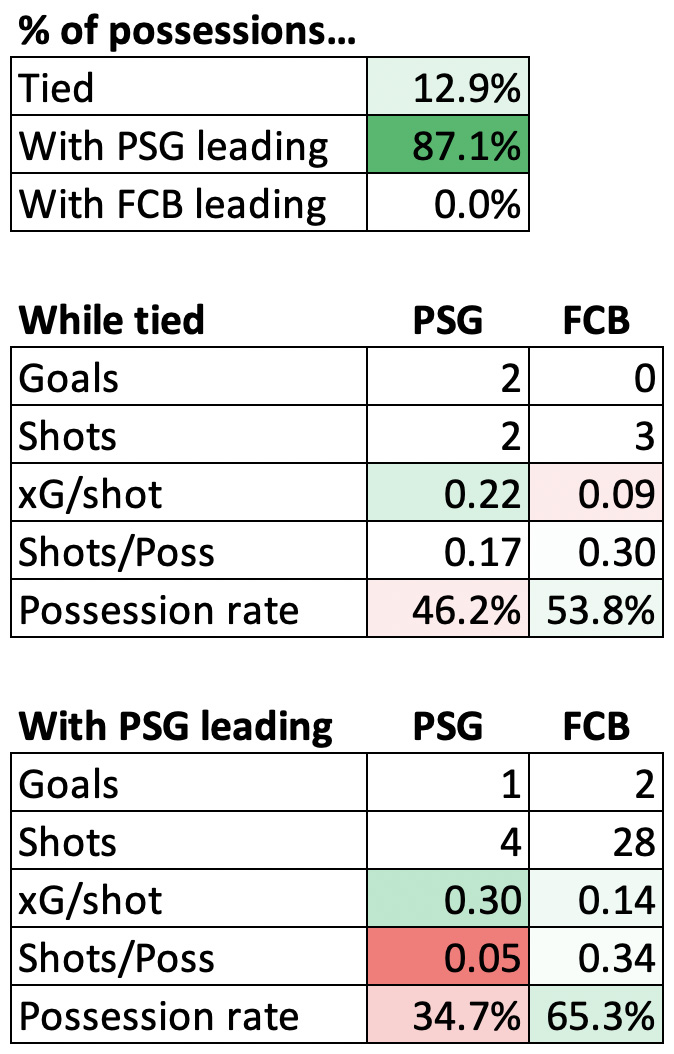
In the 11 minutes or so that this match was tied, PSG created two perfect chances and converted both. In the other 79 minutes or so, they bunkered down like no team has ever bunkered down before, creating one out-of-nowhere goal on a sudden change of possession and otherwise allowing Bayern a decent-looking shot every 170 seconds or so. Goalkeeper Keylor Navas had nearly as many saves as Mbappe had touches, but it somehow got the job done.
For now, anyway. In a week, Bayern will attempt to unleash hell once more, and it will be interesting to see what PSG comes up with to maybe slow them down a bit more this time.
Turns out missing that the best striker in the world matters
Bayern still fielded a lineup featuring Muller, Coman and Leroy Sane on the wings, Kimmich in the middle, etc. When manager Hansi Flick needed a quick tactical shift late in the first half, he was able to sub off Goretzka for one of the most exciting fullbacks in the world, Alphonso Davies, who completed 19 of 21 passes in the attacking third. Almost no team has the roster luxury that Bayern has.
At striker, however, they fielded Choupo-Moting, a PSG backup in 2020-21, instead of Robert Lewandowski, the best striker in the world at the moment. One figures that probably made a difference, but Lewandowski suffered a knee injury on international break and will remain out through next week’s second leg.
Now, it should be noted that Choupo-Moting performed almost exactly to the level stats suggested — his five shot attempts generated 1.2 xG and one goal. The biggest coulda-woulda-shoulda moments came from the trio of Goretzka, Pavard and Alaba, whose 11 shots generated 1.3 xG, some really tight misses and zero goals. But anything less than Lewandowski is a downgrade, and it’s easy to assume he would have created one more quality chance that Bayern’s lineup did not. That said, with all the injuries Neymar has had to deal with through the years, one doesn’t figure PSG feels too sympathetic at the moment.
0:56
ESPN FC’s Stewart Robson assesses Chelsea’s chances of advancing to the Champions League final.


FC Porto 0-2 Chelsea
Return leg: Tuesday, April 13, 3 p.m. ET
Porto ran out of ideas
Porto manager Sergio Conceicao had to be pretty pleased with his team.
In the round of 16, Porto went toe-to-toe with Juventus in the first leg and emerged the better for it, winning 2-1. They did the same in the second until a red card forced them to bunker down a bit, but they managed to survive anyway thanks to a Sergio Oliveira free-kick in extra time that went under a pretty pathetic Juve wall and into the net. Still, they advanced by playing like themselves and not backing down.
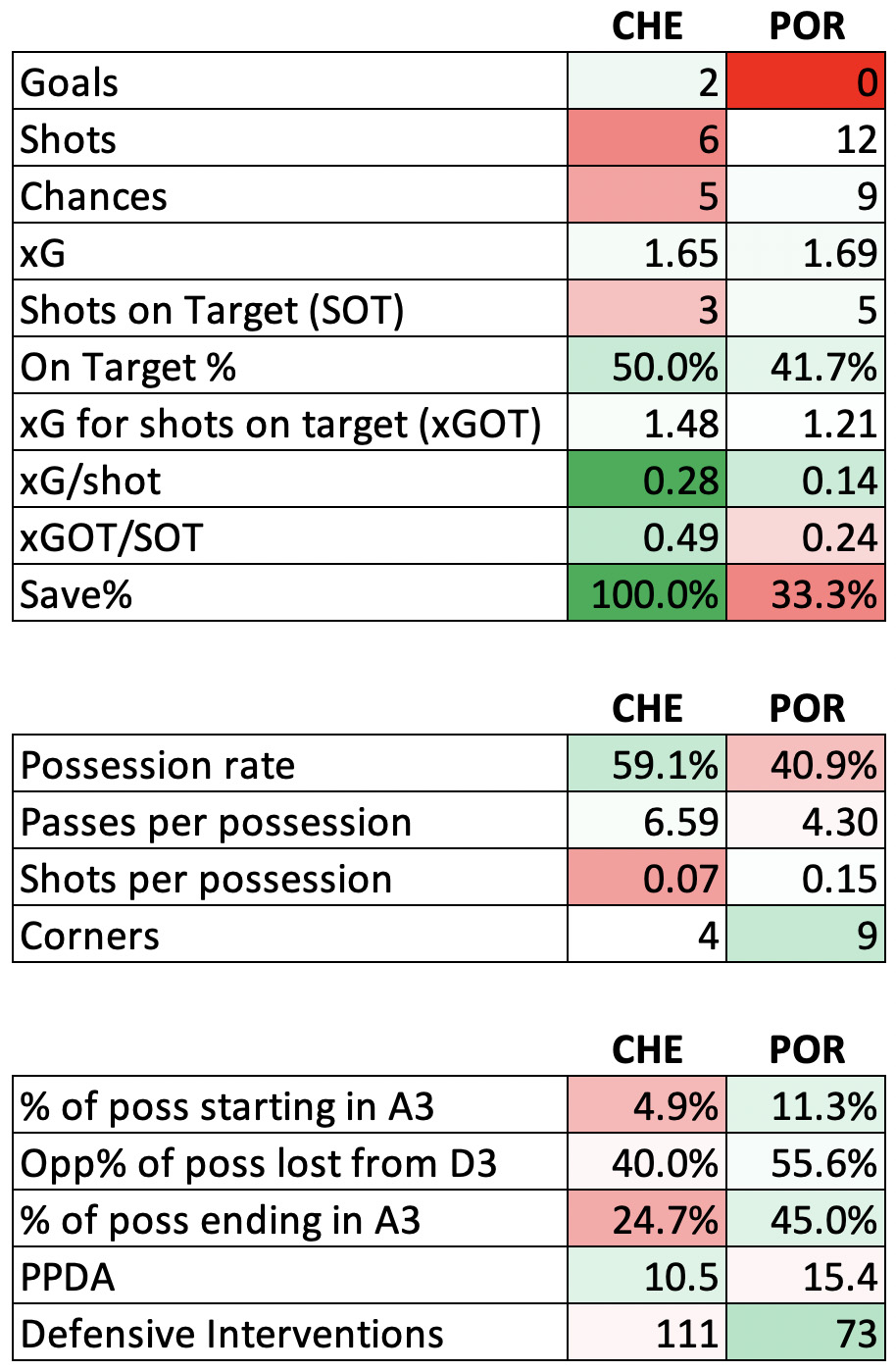
They did so again on Wednesday against an even richer club. They attempted twice the shots as Chelsea and generated a slightly higher xG level (1.69 to 1.65). They pressured the ball effectively, ended nearly twice as many of their possessions in the attacking third and forced Chelsea to primarily play the role of a counter-attacking, defensive team.
The Blues hogged possession, but attempted 62% of their passes in their own half and neither attempted nor completed many long balls or switches of play.
It was, for long stretches, possession for the sake of possession (and for making Porto run some miles off of its tires).
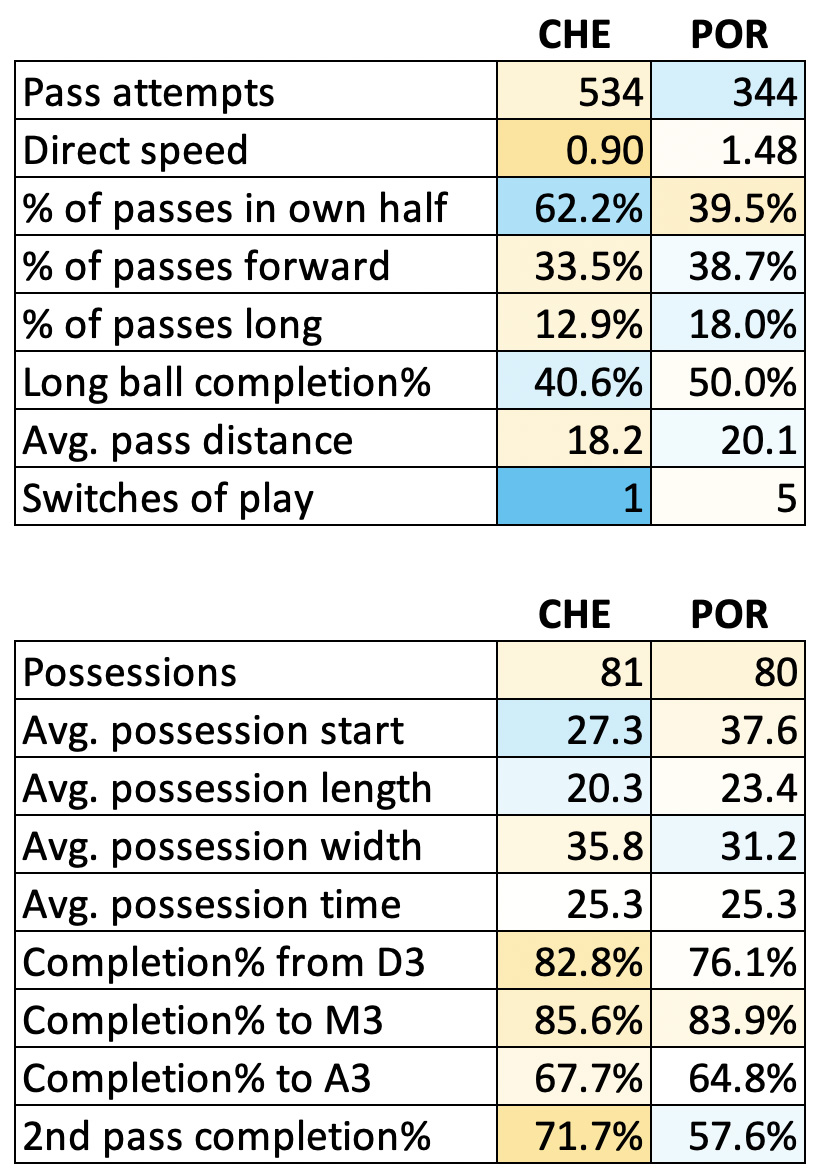
Porto was on the front foot for most of the first half, but in the 32nd minute, a seemingly harmless run of Chelsea possession created a Jorginho-to-Mason Mount goal out of almost nothing.
By this point, Porto had already generated two solid scoring opportunities: a blocked Luis Diaz transition move in the 12th minute and a scary corner-kick opportunity for Zaidu Sanusi in the 24th that sailed over the goal. Moussa Marega would create a decent transition chance in the 51st minute, and Porto nearly scored on another corner in the 56th.
Two-thirds of the way through the match, Porto had 11 shots to Chelsea’s three and had produced 1.6 xG to Chelsea’s 0.4… and then they ran out of ideas.
In the last 30 minutes, they managed only one shot to Chelsea’s three, and all three of Chelsea’s shots could have gone in. Cesar Azpilicueta nearly headed home a free kick at the 63-minute mark, and Christian Pulisic thundered a counter-attacking shot off the bar in the 84th minute.
Just 45 seconds later, Chelsea put the tie away with a one-man counter and goal by Ben Chilwell. The last three chances were Chelsea’s best of the evening, and Porto was saved by the bell, so to speak. If matches were 100 minutes long, this could have been 3-0 or 4-0.
Because matches are only 90 minutes, Porto still heads into the second leg with a shot. But Chelsea’s strong passing and stronger legs made the odds of a comeback pretty small.
